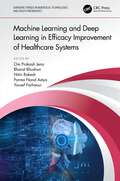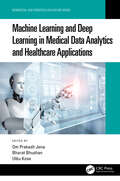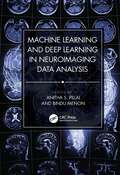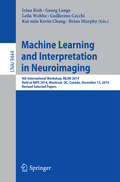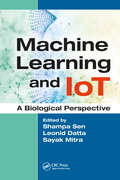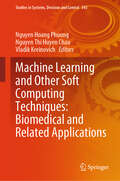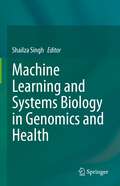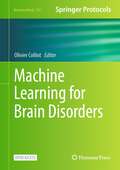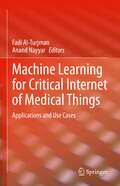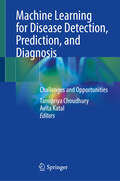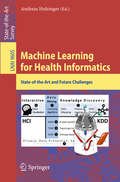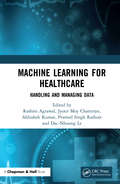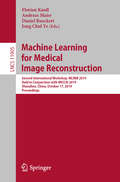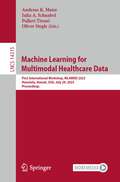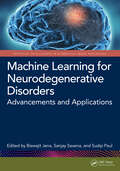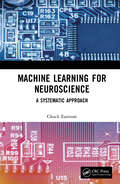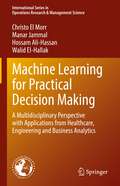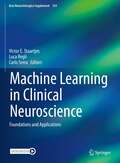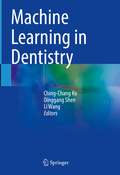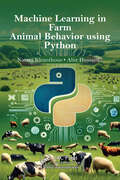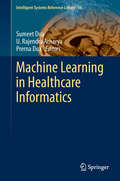- Table View
- List View
Machine Learning and Deep Learning in Computational Toxicology (Computational Methods in Engineering & the Sciences)
by Huixiao HongThis book is a collection of machine learning and deep learning algorithms, methods, architectures, and software tools that have been developed and widely applied in predictive toxicology. It compiles a set of recent applications using state-of-the-art machine learning and deep learning techniques in analysis of a variety of toxicological endpoint data. The contents illustrate those machine learning and deep learning algorithms, methods, and software tools and summarise the applications of machine learning and deep learning in predictive toxicology with informative text, figures, and tables that are contributed by the first tier of experts. One of the major features is the case studies of applications of machine learning and deep learning in toxicological research that serve as examples for readers to learn how to apply machine learning and deep learning techniques in predictive toxicology. This book is expected to provide a reference for practical applications of machine learning and deep learning in toxicological research. It is a useful guide for toxicologists, chemists, drug discovery and development researchers, regulatory scientists, government reviewers, and graduate students. The main benefit for the readers is understanding the widely used machine learning and deep learning techniques and gaining practical procedures for applying machine learning and deep learning in predictive toxicology.
Machine Learning and Deep Learning in Efficacy Improvement of Healthcare Systems (Emerging Trends in Biomedical Technologies and Health informatics)
by Om Prakash JenaThe goal of medical informatics is to improve life expectancy, disease diagnosis and quality of life. Medical devices have revolutionized healthcare and have led to the modern age of machine learning, deep learning and Internet of Medical Things (IoMT) with their proliferation, mobility and agility. This book exposes different dimensions of applications for computational intelligence and explains its use in solving various biomedical and healthcare problems in the real world. This book describes the fundamental concepts of machine learning and deep learning techniques in a healthcare system. The aim of this book is to describe how deep learning methods are used to ensure high-quality data processing, medical image and signal analysis and improved healthcare applications. This book also explores different dimensions of computational intelligence applications and illustrates its use in the solution of assorted real-world biomedical and healthcare problems. Furthermore, it provides the healthcare sector with innovative advances in theory, analytical approaches, numerical simulation, statistical analysis, modelling, advanced deployment, case studies, analytical results, computational structuring and significant progress in the field of machine learning and deep learning in healthcare applications. FEATURES Explores different dimensions of computational intelligence applications and illustrates its use in the solution of assorted real-world biomedical and healthcare problems Provides guidance in developing intelligence-based diagnostic systems, efficient models and cost-effective machines Provides the latest research findings, solutions to the concerning issues and relevant theoretical frameworks in the area of machine learning and deep learning for healthcare systems Describes experiences and findings relating to protocol design, prototyping, experimental evaluation, real testbeds and empirical characterization of security and privacy interoperability issues in healthcare applications Explores and illustrates the current and future impacts of pandemics and mitigates risk in healthcare with advanced analytics This book is intended for students, researchers, professionals and policy makers working in the fields of public health and in the healthcare sector. Scientists and IT specialists will also find this book beneficial for research exposure and new ideas in the field of machine learning and deep learning.
Machine Learning and Deep Learning in Medical Data Analytics and Healthcare Applications (Biomedical and Robotics Healthcare)
by Om Prakash JenaMachine Learning and Deep Learning in Medical Data Analytics and Healthcare Applications introduces and explores a variety of schemes designed to empower, enhance, and represent multi-institutional and multi-disciplinary machine learning (ML) and deep learning (DL) research in healthcare paradigms. Serving as a unique compendium of existing and emerging ML/DL paradigms for the healthcare sector, this book demonstrates the depth, breadth, complexity, and diversity of this multi-disciplinary area. It provides a comprehensive overview of ML/DL algorithms and explores the related use cases in enterprises such as computer-aided medical diagnostics, drug discovery and development, medical imaging, automation, robotic surgery, electronic smart records creation, outbreak prediction, medical image analysis, and radiation treatments. This book aims to endow different communities with the innovative advances in theory, analytical results, case studies, numerical simulation, modeling, and computational structuring in the field of ML/DL models for healthcare applications. It will reveal different dimensions of ML/DL applications and will illustrate their use in the solution of assorted real-world biomedical and healthcare problems. Features: Covers the fundamentals of ML and DL in the context of healthcare applications Discusses various data collection approaches from various sources and how to use them in ML/DL models Integrates several aspects of AI-based computational intelligence such as ML and DL from diversified perspectives which describe recent research trends and advanced topics in the field Explores the current and future impacts of pandemics and risk mitigation in healthcare with advanced analytics Emphasizes feature selection as an important step in any accurate model simulation where ML/DL methods are used to help train the system and extract the positive solution implicitly This book is a valuable source of information for researchers, scientists, healthcare professionals, programmers, and graduate-level students interested in understanding the applications of ML/DL in healthcare scenarios. Dr. Om Prakash Jena is an Assistant Professor in the Department of Computer Science, Ravenshaw University, Cuttack, Odisha, India. Dr. Bharat Bhushan is an Assistant Professor of Department of Computer Science and Engineering (CSE) at the School of Engineering and Technology, Sharda University, Greater Noida, India. Dr. Utku Kose is an Associate Professor in Suleyman Demirel University, Turkey.
Machine Learning and Deep Learning in Neuroimaging Data Analysis
by Anitha S. Pillai Bindu MenonMachine learning (ML) and deep learning (DL) have become essential tools in healthcare. They are capable of processing enormous amounts of data to find patterns and are also adopted into methods that manage and make sense of healthcare data, either electronic healthcare records or medical imagery. This book explores how ML/DL can assist neurologists in identifying, classifying or predicting neurological problems that require neuroimaging. With the ability to model high-dimensional datasets, supervised learning algorithms can help in relating brain images to behavioral or clinical observations and unsupervised learning can uncover hidden structures/patterns in images. Bringing together artificial intelligence (AI) experts as well as medical practitioners, these chapters cover the majority of neuro problems that use neuroimaging for diagnosis, along with case studies and directions for future research.
Machine Learning and Interpretation in Neuroimaging
by Brian Murphy Georg Langs Irina Rish Leila Wehbe Guillermo Cecchi Kai-min Kevin ChangThis book constitutes the revised selected papers from the 4th International Workshop on Machine Learning and Interpretation in Neuroimaging, MLINI 2014, held in Montreal, QC, Canada, in December 2014 as a satellite event of the 11th annual conference on Neural Information Processing Systems, NIPS 2014. The 10 MLINI 2014 papers presented in this volume were carefully reviewed and selected from 17 submissions. They were organized in topical sections named: networks and decoding; speech; clinics and cognition; and causality and time-series. In addition, the book contains the 3 best papers presented at MLINI 2013.
Machine Learning and IoT: A Biological Perspective
by Shampa Sen, Leonid Datta and Sayak MitraThis book discusses some of the innumerable ways in which computational methods can be used to facilitate research in biology and medicine - from storing enormous amounts of biological data to solving complex biological problems and enhancing treatment of various grave diseases.
Machine Learning and Other Soft Computing Techniques: Biomedical and Related Applications (Studies in Systems, Decision and Control #543)
by Vladik Kreinovich Nguyen Hoang Phuong Nguyen Thi Huyen ChauThis book contains applications to various health-related problems, from designing and maintaining a proper diet to enhancing hygiene to analysis of mammograms and left-right brain activity to treating diseases such as diabetes and drug addictions. Health issues are very important. So naturally whatever new data processing technique appears, researchers try to apply it to health issues as well. From this viewpoint, Artificial Intelligence (AI) and Computational Intelligence (CI) techniques are no exception: they have been successfully applied to medicine, and more promising applications are on the way. Applications of AI and CI techniques to health issues are the main focus of this book. Health issues are also very delicate, because human bodies are complex organisms. No matter how interesting and promising are new ideas and new techniques, there is always a possibility of unexpected side effects. Because of this, we cannot apply untested methods to patients, and we first need to test these methods on other less critical applications. Several book chapters describe such applications—whose success paves the way for these methods to be used in biomedical situations. These applications range from human/face detection to predicting student success to predicting election results to explaining the observed intensity of space light. We hope that this book helps practitioners and researchers to learn more about computational intelligence techniques and their biomedical applications—and to further develop this important research direction.
Machine Learning and Python for Human Behavior, Emotion, and Health Status Analysis
by Md Zia UddinThis book is a practical guide for individuals interested in exploring and implementing smart home applications using Python. Comprising six chapters enriched with hands-on codes, it seamlessly navigates from foundational concepts to cutting-edge technologies, balancing theoretical insights and practical coding experiences. In short, it is a gateway to the dynamic intersection of Python programming, smart home technology, and advanced machine learning applications, making it an invaluable resource for those eager to explore this rapidly growing field.Key Features: Throughout the book, practicality takes precedence, with hands-on coding examples accompanying each concept to facilitate an interactive learning journey Striking a harmonious balance between theoretical foundations and practical coding, the book caters to a diverse audience, including smart home enthusiasts and researchers The content prioritizes real-world applications, ensuring readers can immediately apply the knowledge gained to enhance smart home functionalities Covering Python basics, feature extraction, deep learning, and XAI, the book provides a comprehensive guide, offering an overall understanding of smart home applications
Machine Learning and Systems Biology in Genomics and Health
by Shailza SinghThis book discusses the application of machine learning in genomics. Machine Learning offers ample opportunities for Big Data to be assimilated and comprehended effectively using different frameworks. Stratification, diagnosis, classification and survival predictions encompass the different health care regimes representing unique challenges for data pre-processing, model training, refinement of the systems with clinical implications. The book discusses different models for in-depth analysis of different conditions. Machine Learning techniques have revolutionized genomic analysis. Different chapters of the book describe the role of Artificial Intelligence in clinical and genomic diagnostics. It discusses how systems biology is exploited in identifying the genetic markers for drug discovery and disease identification. Myriad number of diseases whether be infectious, metabolic, cancer can be dealt in effectively which combines the different omics data for precision medicine. Major breakthroughs in the field would help reflect more new innovations which are at their pinnacle stage. This book is useful for researchers in the fields of genomics, genetics, computational biology and bioinformatics.
Machine Learning for Advanced Functional Materials
by Nirav Joshi Vinod Kushvaha Priyanka MadhushriThis book presents recent advancements of machine learning methods and their applications in material science and nanotechnologies. It provides an introduction to the field and for those who wish to explore machine learning in modeling as well as conduct data analyses of material characteristics. The book discusses ways to enhance the material’s electrical and mechanical properties based on available regression methods for supervised learning and optimization of material attributes. In summary, the growing interest among academics and professionals in the field of machine learning methods in functional nanomaterials such as sensors, solar cells, and photocatalysis is the driving force for behind this book. This is a comprehensive scientific reference book on machine learning for advanced functional materials and provides an in-depth examination of recent achievements in material science by focusing on topical issues using machine learning methods.
Machine Learning for Brain Disorders (Neuromethods #197)
by Olivier ColliotThis Open Access volume provides readers with an up-to-date and comprehensive guide to both methodological and applicative aspects of machine learning (ML) for brain disorders. The chapters in this book are organized into five parts. Part One presents the fundamentals of ML. Part Two looks at the main types of data used to characterize brain disorders, including clinical assessments, neuroimaging, electro- and magnetoencephalography, genetics and omics data, electronic health records, mobile devices, connected objects and sensors. Part Three covers the core methodologies of ML in brain disorders and the latest techniques used to study them. Part Four is dedicated to validation and datasets, and Part Five discusses applications of ML to various neurological and psychiatric disorders. In the Neuromethods series style, chapters include the kind of detail and key advice from the specialists needed to get successful results in your laboratory.Comprehensive and cutting, Machine Learning for Brain Disorders is a valuable resource for researchers and graduate students who are new to this field, as well as experienced researchers who would like to further expand their knowledge in this area. This book will be useful to students and researchers from various backgrounds such as engineers, computer scientists, neurologists, psychiatrists, radiologists, and neuroscientists.
Machine Learning for Critical Internet of Medical Things: Applications and Use Cases
by Fadi Al-Turjman Anand NayyarThis book discusses the applications, challenges, and future trends of machine learning in medical domain, including both basic and advanced topics. The book presents how machine learning is helpful in smooth conduction of administrative processes in hospitals, in treating infectious diseases, and in personalized medical treatments. The authors show how machine learning can also help make fast and more accurate disease diagnoses, easily identify patients, help in new types of therapies or treatments, model small-molecule drugs in pharmaceutical sector, and help with innovations via integrated technologies such as artificial intelligence as well as deep learning. The authors show how machine learning also improves the physician’s and doctor’s medical capabilities to better diagnosis their patients. This book illustrates advanced, innovative techniques, frameworks, concepts, and methodologies of machine learning that will enhance the efficiency and effectiveness of the healthcare system.Provides researchers in machine and deep learning with a conceptual understanding of various methodologies of implementing the technologies in medical areas;Discusses the role machine learning and IoT play into locating different virus and diseases across the globe, such as COVID-19, Ebola, and cervical cancer;Includes fundamentals and advances in machine learning in the medical field, supported by significant case studies and practical applications.
Machine Learning for Disease Detection, Prediction, and Diagnosis: Challenges and Opportunities
by Tanupriya Choudhury Avita KatalThe book &“Machine Learning for Disease Detection, Prediction, and Diagnosis&” can be a comprehensive guide to the novel concepts, techniques, and frameworks essential for improving the viability of existing machine-learning practices. It provides an in-depth analysis of how these new technologies are helpful to detect, predict and diagnose diseases more accurately. The book covers various topics such as image classification algorithms, supervised learning methods like support vector machines (SVM), deep neural networks (DNNs), convolutional neural networks (CNNs), etc. unsupervised approaches such as clustering algorithms as well as reinforcement learning strategies. This book is an invaluable resource for anyone interested in machine-learning applications related to disease detection or diagnosis. It explains different concepts and provides practical examples of how they can it implements using real-world data sets from medical imaging datasets or public health records databases, among others. Furthermore, it offers insights into recent advances made by researchers which have enabled automated decision-making systems based on AI models with improved accuracy over traditional methods. This text also discusses ways through which current models could improve further by incorporating domain knowledge during the model training phase, thereby increasing their efficacy even further. Overall, this book serves as a great source of information about the latest advancements made in the field of Machine Learning & Artificial Intelligence towards efficient building systems capable enough detecting & diagnosing diseases automatically while avoiding human errors resulting due manual intervention at any stage along process pipeline thus ensuring better outcomes overall. Moreover, it helps readers understand the underlying principles behind each technique discussed so that they may apply them according to their own application scenarios efficiently without worrying much about the implementation details required to get the job done the right way the first time around itself!
Machine Learning for Health Informatics
by Andreas HolzingerMachine learning (ML) is the fastest growing field in computer science, and Health Informatics (HI) is amongst the greatest application challenges, providing future benefits in improved medical diagnoses, disease analyses, and pharmaceutical development. However, successful ML for HI needs a concerted effort, fostering integrative research between experts ranging from diverse disciplines from data science to visualization. Tackling complex challenges needs both disciplinary excellence and cross-disciplinary networking without any boundaries. Following the HCI-KDD approach, in combining the best of two worlds, it is aimed to support human intelligence with machine intelligence. This state-of-the-art survey is an output of the international HCI-KDD expert network and features 22 carefully selected and peer-reviewed chapters on hot topics in machine learning for health informatics; they discuss open problems and future challenges in order to stimulate further research and international progress in this field.
Machine Learning for Healthcare: Handling and Managing Data
by Rashmi Agrawal, Jyotir Moy Chatterjee, Abhishek Kumar, Pramod Singh Rathore and Dac-Nhuong LeMachine Learning for Healthcare: Handling and Managing Data provides in-depth information about handling and managing healthcare data through machine learning methods. This book expresses the long-standing challenges in healthcare informatics and provides rational explanations of how to deal with them. Machine Learning for Healthcare: Handling and Managing Data provides techniques on how to apply machine learning within your organization and evaluate the efficacy, suitability, and efficiency of machine learning applications. These are illustrated in a case study which examines how chronic disease is being redefined through patient-led data learning and the Internet of Things. This text offers a guided tour of machine learning algorithms, architecture design, and applications of learning in healthcare. Readers will discover the ethical implications of machine learning in healthcare and the future of machine learning in population and patient health optimization. This book can also help assist in the creation of a machine learning model, performance evaluation, and the operationalization of its outcomes within organizations. It may appeal to computer science/information technology professionals and researchers working in the area of machine learning, and is especially applicable to the healthcare sector. The features of this book include: A unique and complete focus on applications of machine learning in the healthcare sector. An examination of how data analysis can be done using healthcare data and bioinformatics. An investigation of how healthcare companies can leverage the tapestry of big data to discover new business values. An exploration of the concepts of machine learning, along with recent research developments in healthcare sectors.
Machine Learning for Medical Image Reconstruction: Second International Workshop, MLMIR 2019, Held in Conjunction with MICCAI 2019, Shenzhen, China, October 17, 2019, Proceedings (Lecture Notes in Computer Science #11905)
by Daniel Rueckert Andreas Maier Florian Knoll Jong Chul YeThis book constitutes the refereed proceedings of the Second International Workshop on Machine Learning for Medical Reconstruction, MLMIR 2019, held in conjunction with MICCAI 2019, in Shenzhen, China, in October 2019. The 24 full papers presented were carefully reviewed and selected from 32 submissions. The papers are organized in the following topical sections: deep learning for magnetic resonance imaging; deep learning for computed tomography; and deep learning for general image reconstruction.
Machine Learning for Multimodal Healthcare Data: First International Workshop, ML4MHD 2023, Honolulu, Hawaii, USA, July 29, 2023, Proceedings (Lecture Notes in Computer Science #14315)
by Julia A. Schnabel Andreas K. Maier Pallavi Tiwari Oliver StegleThis book constitutes the proceedings of the First International Workshop on Machine Learning for Multimodal Healthcare Date, ML4MHD 2023, held in Honolulu, Hawaii, USA, in July 2023. The 18 full papers presented were carefully reviewed and selected from 30 submissions. The workshop's primary objective was to bring together experts from diverse fields such as medicine, pathology, biology, and machine learning. With the aim to present novel methods and solutions that address healthcare challenges, especially those that arise from the complexity and heterogeneity of patient data.
Machine Learning for Neurodegenerative Disorders: Advancements and Applications (Artificial Intelligence in Biomedical Image Processing)
by Sudip Paul Sanjay Saxena Biswajit JenaThis book explores the application of machine learning to the understanding, early diagnosis, and management of neurodegenerative disorders. With a specific focus on its role in ongoing clinical trials, the book covers essential topics such as data collection, pre-processing, feature extraction, model development, and validation techniques. It delves into the applications of neuroimaging techniques like magnetic resonance imaging (MRI), computed tomography (CT), and positron emission tomography (PET) in the diagnosis and understanding of neurodegenerative disorders. Additionally, the book examines various machine-learning algorithms employed for biomarker discovery in neurodegenerative disorders. It highlights the role of neuroinformatics and big data analysis in advancing the understanding and management of neurodegenerative disorders. Furthermore, the book reviews future prospects and presents the ethical considerations and regulatory challenges associated with implementing machine learning approaches in the diagnosis, treatment, and prevention of neurodegenerative disorders. This comprehensive resource is intended for neuroscientists, students, researchers, and neurologists to understand the emerging scope of machine learning in neurodegenerative disorders.
Machine Learning for Neuroscience: A Systematic Approach
by Chuck EasttomThis book addresses the growing need for machine learning and data mining in neuroscience. The book offers a basic overview of the neuroscience, machine learning and the required math and programming necessary to develop reliable working models. The material is presented in a easy to follow user-friendly manner and is replete with fully working machine learning code. Machine Learning for Neuroscience: A Systematic Approach, tackles the needs of neuroscience researchers and practitioners that have very little training relevant to machine learning. The first section of the book provides an overview of necessary topics in order to delve into machine learning, including basic linear algebra and Python programming. The second section provides an overview of neuroscience and is directed to the computer science oriented readers. The section covers neuroanatomy and physiology, cellular neuroscience, neurological disorders and computational neuroscience. The third section of the book then delves into how to apply machine learning and data mining to neuroscience and provides coverage of artificial neural networks (ANN), clustering, and anomaly detection. The book contains fully working code examples with downloadable working code. It also contains lab assignments and quizzes, making it appropriate for use as a textbook. The primary audience is neuroscience researchers who need to delve into machine learning, programmers assigned neuroscience related machine learning projects and students studying methods in computational neuroscience.
Machine Learning for Practical Decision Making: A Multidisciplinary Perspective with Applications from Healthcare, Engineering and Business Analytics (International Series in Operations Research & Management Science #334)
by Hossam Ali-Hassan Christo El Morr Manar Jammal Walid EI-HallakThis book provides a hands-on introduction to Machine Learning (ML) from a multidisciplinary perspective that does not require a background in data science or computer science. It explains ML using simple language and a straightforward approach guided by real-world examples in areas such as health informatics, information technology, and business analytics. The book will help readers understand the various key algorithms, major software tools, and their applications. Moreover, through examples from the healthcare and business analytics fields, it demonstrates how and when ML can help them make better decisions in their disciplines. The book is chiefly intended for undergraduate and graduate students who are taking an introductory course in machine learning. It will also benefit data analysts and anyone interested in learning ML approaches.
Machine Learning in Biological Sciences: Updates and Future Prospects
by Shyamasree Ghosh Rathi DasguptaThis book gives an overview of applications of Machine Learning (ML) in diverse fields of biological sciences, including healthcare, animal sciences, agriculture, and plant sciences. Machine learning has major applications in process modelling, computer vision, signal processing, speech recognition, and language understanding and processing and life, and health sciences. It is increasingly used in understanding DNA patterns and in precision medicine. This book is divided into eight major sections, each containing chapters that describe the application of ML in a certain field. The book begins by giving an introduction to ML and the various ML methods. It then covers interesting and timely aspects such as applications in genetics, cell biology, the study of plant-pathogen interactions, and animal behavior. The book discusses computational methods for toxicity prediction of environmental chemicals and drugs, which forms a major domain of research in the field of biology. It is of relevance to post-graduate students and researchers interested in exploring the interdisciplinary areas of use of machine learning and deep learning in life sciences.
Machine Learning in Clinical Neuroscience: Foundations and Applications (Acta Neurochirurgica Supplement #134)
by Luca Regli Victor E. Staartjes Carlo SerraThis book bridges the gap between data scientists and clinicians by introducing all relevant aspects of machine learning in an accessible way, and will certainly foster new and serendipitous applications of machine learning in the clinical neurosciences. Building from the ground up by communicating the foundational knowledge and intuitions first before progressing to more advanced and specific topics, the book is well-suited even for clinicians without prior machine learning experience. Authored by a wide array of experienced global machine learning groups, the book is aimed at clinicians who are interested in mastering the basics of machine learning and who wish to get started with their own machine learning research. The volume is structured in two major parts: The first uniquely introduces all major concepts in clinical machine learning from the ground up, and includes step-by-step instructions on how to correctly develop and validate clinical prediction models. It also includes methodological and conceptual foundations of other applications of machine learning in clinical neuroscience, such as applications of machine learning to neuroimaging, natural language processing, and time series analysis. The second part provides an overview of some state-of-the-art applications of these methodologies. The Machine Intelligence in Clinical Neuroscience (MICN) Laboratory at the Department of Neurosurgery of the University Hospital Zurich studies clinical applications of machine intelligence to improve patient care in clinical neuroscience. The group focuses on diagnostic, prognostic and predictive analytics that aid in decision-making by increasing objectivity and transparency to patients. Other major interests of our group members are in medical imaging, and intraoperative applications of machine vision.
Machine Learning in Dentistry
by Li Wang Dinggang Shen Ching-Chang KoThis book reviews all aspects of the use of machine learning in contemporary dentistry, clearly explaining its significance for dental imaging, oral diagnosis and treatment, dental designs, and dental research. Machine learning is an emerging field of artificial intelligence research and practice in which computer agents are employed to improve perception, cognition, and action based on their ability to “learn”, for example through use of big data techniques. Its application within dentistry is designed to promote personalized and precision patient care, with enhancement of diagnosis and treatment planning. In this book, readers will find up-to-date information on different machine learning tools and their applicability in various dental specialties. The selected examples amply illustrate the opportunities to employ a machine learning approach within dentistry while also serving to highlight the associated challenges. Machine Learning in Dentistry will be of value for all dental practitioners and researchers who wish to learn more about the potential benefits of using machine learning techniques in their work.
Machine Learning in Farm Animal Behavior using Python
by Natasa Kleanthous Abir HussainThis book is a comprehensive guide to applying machine learning to animal behavior analysis, focusing on activity recognition in farm animals. It begins by introducing key concepts of animal behavior and ethology, followed by an exploration of machine learning techniques, including supervised, unsupervised, semi-supervised, and reinforcement learning. The practical section covers essential steps like data collection, preprocessing, exploratory data analysis, feature extraction, model training, and evaluation, using Python.The book emphasizes the importance of high-quality data and discusses various sensors and annotation methods for effective data collection. It addresses key machine learning challenges such as generalization and data issues. Advanced topics include feature selection, model selection, hyperparameter tuning, and deep learning algorithms. Practical examples and Python implementations are provided throughout, offering hands-on experience for researchers, students, and professionals aiming to apply machine learning to animal behavior analysis.
Machine Learning in Healthcare Informatics
by Sumeet Dua U. Rajendra Acharya Prerna DuaThe book is a unique effort to represent a variety of techniques designed to represent, enhance, and empower multi-disciplinary and multi-institutional machine learning research in healthcare informatics. The book provides a unique compendium of current and emerging machine learning paradigms for healthcare informatics and reflects the diversity, complexity and the depth and breath of this multi-disciplinary area. The integrated, panoramic view of data and machine learning techniques can provide an opportunity for novel clinical insights and discoveries.

